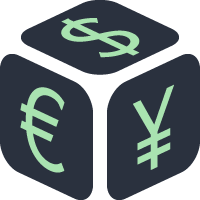What About Forex Trading: The Crypto Connection

What About Forex Trading: A Comprehensive Guide
Forex trading, a potent blend of strategy, analysis, and timing, presents a fascinating opportunity to engage in a dynamic and massive financial market. For those acquainted with the likes of cryptocurrencies, Forex trading unfolds another dimension of trading, where global currencies exchange hands worth trillions of dollars daily. But what is Forex trading, and why should you, as an investor or trading enthusiast, pay attention to it? Allow us to unravel the mysteries.
Understanding the Forex Market
Forex, or Foreign Exchange, refers to the global marketplace for trading national currencies. Currencies are crucial because they allow purchasing goods and services both domestically and across borders. To conduct foreign trade and business, currencies need to be exchanged.
The Forex market is the largest and most liquid market in the world. It operates 24 hours a day, five days a week, across major financial centers of the world, hence functioning at almost any given time of day. The Forex market is not centralized on an exchange; instead, currency trading is conducted over-the-counter (OTC).
Why Forex Trading Stands Out
-
Liquidity and Volume: The Forex market deals with upwards of $6 trillion in trades daily, offering unparalleled liquidity. This immense liquidity ensures narrow spreads and allows traders to enter and exit positions with ease.
-
Accessibility: Forex trading is highly accessible. With lower capital requirements compared to other markets, anyone can start trading from anywhere with an internet connection and a basic understanding of the market.
-
Diverse Pairs and Strategies: Forex trading involves diverse currency pairs—from majors like EUR/USD to exotics like USD/TRY. Additionally, traders have a multitude of strategies at their disposal, from trend-following to scalping.
Strategies and Approaches
A variety of strategies can be employed in Forex trading that cater to different risk appetites and timeframes.
Day Trading
Day trading involves buying and selling currency pairs within a single trading day. The focus lies on small price movements, requiring traders to act quickly and decisively. Day traders often rely on technical analysis to make informed decisions.
Swing Trading
Swing trading involves holding positions for a few days to capture price swings over a short period. Swing traders use both technical and fundamental analysis to identify and take advantage of market trends.
Scalping
Scalping is a short-term strategy that focuses on making multiple trades within a day to profit from small price movements. It requires a trader to have discipline, quick decision-making skills, and impeccable timing.
Comparing Forex and Cryptocurrency Trading
While both Forex and cryptocurrency trading involve buying and selling, there are notable differences worth understanding.
-
Regulation: Forex markets are more regulated than cryptocurrency markets, providing a framework that can potentially safeguard investments. Cryptocurrencies are often seen as high-risk due to their relative lack of regulation.
-
Volatility: Cryptocurrencies are known for their volatility. While this can lead to high profits, it also increases risk. Forex markets, while volatile, tend to be more stable compared to cryptocurrencies.
-
Market Hours: Forex trading is restricted to weekdays, but with its cross-border nature, it runs all day long. Cryptocurrency markets, however, operate 24/7 year-round.
Risk Management
Successful Forex trading is heavily reliant on efficient risk management. Traders must consider the size of each trade, the use of leverage, and where to set stop-loss orders to minimize potential losses.
-
Leverage: Forex trading often involves leverage, allowing traders to control larger positions than their initial deposit. While it magnifies profits, it also amplifies losses.
-
Stop-Loss Orders: Protect your investment by using stop-loss orders, which automatically close a trade at a predetermined loss level to prevent further losses.
-
Diversification: Diversify your trades by investing in different currency pairs or even integrating assets from the crypto or stock markets to better manage risk.
Tools and Platforms
For those interested in diving into Forex, several platforms offer the means to start trading. When choosing, consider transaction fees, interface usability, regulatory compliance, and available currency pairs. Bitget Exchange offers a solid platform, known for its user-friendly features and global market reach.
Education and Resources
Educate yourself before diving into live trading. Utilize resources like online courses, webinars, and demo trading accounts to gain confidence and experience. Understanding both technical and fundamental analysis will aid in making informed decisions.
The Future of Forex
With the advent of technology and automation, Forex trading is evolving rapidly. Artificial intelligence and algorithmic trading are becoming mainstream, providing sophisticated analytical tools to predict market trends better.
More traders are beginning to explore automated systems that trade on their behalf, removing the emotional aspects of trading and focusing purely on data and market conditions.
You Could Be The Next Successful Trader
Whether you're a seasoned trader in the crypto space looking to diversify or a newcomer drawn to the expansive world of currency exchange, Forex trading offers an exciting avenue to explore. With its vast market, ample opportunities for strategy development, and the chance for consistent returns, Forex trading stands tall in the financial arena.
By equipping yourself with knowledge, practicing risk management, and utilizing the right tools, you position yourself to seize the vast opportunities of the Forex market. As you embark on or continue your trading journey, keep refining your skills and stay abreast of market developments. The Forex market is alive with potential, waiting for you to make your mark.
Latest articles
See moreAbout author
I'm Crypto Trailblazer, a bilingual pioneer in the crypto space. I can interpret the ecological changes after Ethereum's merge and the technological breakthroughs of Layer 2 solutions in English, while analyzing the progress of the Russian Central Bank Digital Currency (CBDC) pilot and the collaboration models of St. Petersburg's blockchain community in Russian. Having worked on building a decentralized identity verification system in Moscow and explored the integration path of NFTs and the metaverse in New York, I'll unveil the developmental differences and shared opportunities of blockchain technology in Europe, the US, and Russia from a bilingual perspective.






















